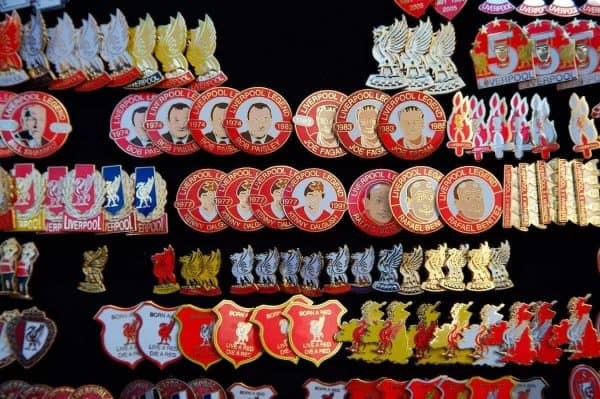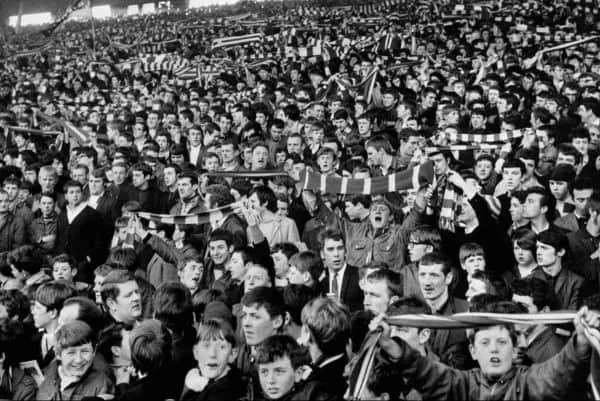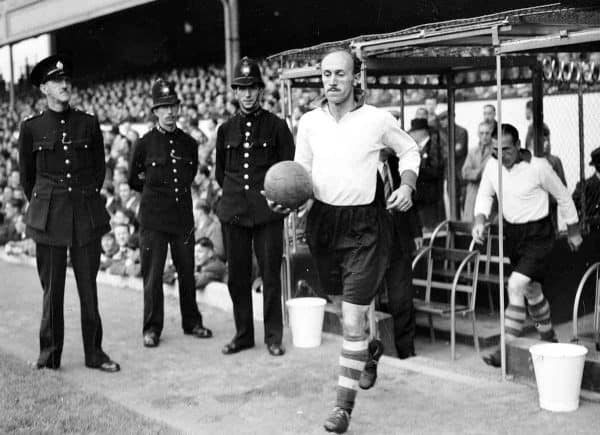In November 1946, Jack Balmer joined an exclusive group, one which has failed to be added to across English football in the succeeding years.
The 1946/47 season was the longest on record after a deep freeze descended over England in what was the first full season after the conclusion of the Second World War.
And the Reds would defy the odds to be crowned English league champions for the third time in the club’s history, and the first time in 24 years.
It was a historic campaign and one which Balmer was integral to, scoring 24 times in 39 games – a run which saw him take English football by storm as he notched three consecutive hat-tricks.
It was November and Liverpool had entrenched themselves in the top two, losing merely two of their opening 13 games of the season before a run of three games where Balmer captivated the masses and saw his name thrust onto the front pages.

The first came against Portsmouth at Anfield, with a first-half penalty then accompanied by two strikes in nine minutes late in the clash to seal a 3-0 win.
It was just a taste of things to come, as just seven days later he would score four in a remarkable 17-minute spell against Derby Country.
Liverpool would emerge as 4-1 victors and end the day as league leaders thanks to the lethal boot of Balmer, with a report full of endearing words after a mesmerising outing:
“The game was a personal triumph for Jack Balmer, the team’s captain and inside right. Following his hat-trick of the previous week, he scored all four Liverpool goals and made the Derby defenders look very second-rate the way he ran through them, almost at his own free will.”
With two successive hat-tricks already under his belt, the third would follow against Arsenal as his goal-scoring boots remained firmly in place as he put on a show for the Liverpool faithful in a 4-2 win.
He opened the scoring front the penalty spot after just 15 minutes before scoring the last two in a hurry, seven second-half minutes to be exact, as the Reds overturned a one-goal deficit to swiftly pull away from the Gunners in devastating fashion.
The Liverpool Echo documented the moment history was made:
“All that was needed now was a Balmer goal to make three hat-tricks in succession. No sooner had the words been spoken than Eastham started the run which produced an angled chance for Balmer, who veered to the right, and put the ball into the net to the biggest cheer Anfield has ever known in its long history.
“Having scored a hat-trick of hat-tricks, and 10 goals in three matches, Balmer must have established a record which will stand for many a year. He was mobbed by his delighted teammates.”
The hat-trick of hat-tricks cemented Balmer’s name into the record books having become only the third player to achieve the feat in the first division after Tottenham’s Tom Jennings in 1925 and Leeds’ Frank Osborne in 1926.
And remarkably, since Balmer added his name to the list in 1946, no other player has managed to replicate the feat in the top division.
It is an achievement that he would later reflect on fondly, but humbly insisted it would never have come to be without his teammates.
“Towards the end of a long career memories crowd thick and fast on one. That which remains most fresh in my mind was when I had the good fortune, thanks to the unselfishness of my team-mates, to score three successive hat-tricks in 1946-47.”

Balmer’s superior skill and intelligence ensured he became one of Liverpool’s greatest forwards, and despite his stunning goal return, the fierce aggression lacking in his game polarised a sub-section of Liverpool’s fans.
But it simply was not his style of play or “idea of football,” and in the end it would matter little as he would end his career at Liverpool, who he joined at 19 after being let go by Everton, with 309 games and 110 goals across all competitions.
Balmer, who is still considered as the man responsible for Liverpool’s fastest goal after just 10 seconds against Everton in 1938, would captain his club from 1947-49 before turning to coaching from 1952-55.
A distinguished and loyal servant who sits in 14th position on Liverpool’s all-time top goalscorer list.

















Fan Comments